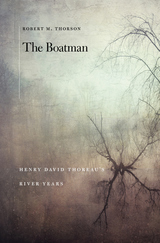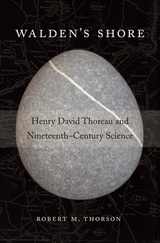
As a backyard naturalist and river enthusiast, Henry David Thoreau was keenly aware of the many ways in which humans had altered the waterways and meadows of his beloved Concord River Valley. A land surveyor by trade, he recognized that he was as complicit in these transformations as the bankers, builders, and elected officials who were his clients. The Boatman reveals the depth of his knowledge about the river as it elegantly chronicles his move from anger to lament to acceptance of how humans had changed a place he cherished even more than Walden Pond.
“A scrupulous account of the environment Thoreau loved most… Thorson argues convincingly—sometimes beautifully—that Thoreau’s thinking and writing were integrally connected to paddling and sailing.”
—Wall Street Journal
“An in-depth account of Thoreau’s lifelong love of boats, his skill as a navigator, his intimate knowledge of the waterways around Concord, and his extensive survey of the Concord River.”
—Robert Pogue Harrison, New York Review of Books
“An impressive feat of empirical research…an important contribution to the scholarship on Thoreau as natural scientist.”
—Los Angeles Review of Books
“The Boatman presents a whole new Thoreau—the river rat. This is not just groundbreaking, but fun.”
—David Gessner, author of All the Wild That Remains

"Let us settle ourselves, and work and wedge our feet downward," Thoreau invites his readers in Walden, "till we come to a hard bottom and rocks in place, which we can call reality." Walden's Shore explores Thoreau's understanding of that hard reality, not as metaphor but as physical science. Robert M. Thorson is interested in Thoreau the rock and mineral collector, interpreter of landscapes, and field scientist whose compass and measuring stick were as important to him as his plant press. At Walden's climax, Thoreau asks us to imagine a "living earth" upon which all animal and plant life is parasitic. This book examines Thoreau's understanding of the geodynamics of that living earth, and how his understanding informed the writing of Walden.
The story unfolds against the ferment of natural science in the nineteenth century, as Natural Theology gave way to modern secular science. That era saw one of the great blunders in the history of American science--the rejection of glacial theory. Thorson demonstrates just how close Thoreau came to discovering a "theory of everything" that could have explained most of the landscape he saw from the doorway of his cabin at Walden. At pivotal moments in his career, Thoreau encountered the work of the geologist Charles Lyell and that of his protégé Charles Darwin. Thorson concludes that the inevitable path of Thoreau's thought was descendental, not transcendental, as he worked his way downward through the complexity of life to its inorganic origin, the living rock.
READERS
Browse our collection.
PUBLISHERS
See BiblioVault's publisher services.
STUDENT SERVICES
Files for college accessibility offices.
UChicago Accessibility Resources
home | accessibility | search | about | contact us
BiblioVault ® 2001 - 2024
The University of Chicago Press









